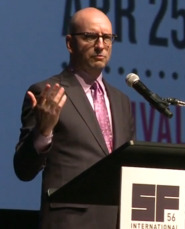Boats against the current, borne back ceaselessly into weak adaptations of great books
 Thursday, May 9, 2013 at 9:45PM
Thursday, May 9, 2013 at 9:45PM  Hi all, Tim here. Like a lot of you, I’ve been waiting on Baz Luhrmann’s brand-new, all-3D, all-CGI version of The Great Gatsby with a kind of curious dread, on the assumption that the no-doubt overwhelming style and glitz would leave F. Scott Fitzgerald’s excavation of the limits of American ingenuity and self-invention a little bit lost amidst all the eye candy. And this seems to have been exactly the case, sadly.
Hi all, Tim here. Like a lot of you, I’ve been waiting on Baz Luhrmann’s brand-new, all-3D, all-CGI version of The Great Gatsby with a kind of curious dread, on the assumption that the no-doubt overwhelming style and glitz would leave F. Scott Fitzgerald’s excavation of the limits of American ingenuity and self-invention a little bit lost amidst all the eye candy. And this seems to have been exactly the case, sadly.
But let us not come down too hard on Baz. There’s also the possibility that Gatsby simply isn’t a novel that’s meant to be filmed, and as evidence I’d like to call upon the last feature film adaptation, and certainly the best known prior to now. Of course, I mean the 1974 Paramount production starring Robert Redford as Jay Gatsby, Mia Farrow as Daisy Buchanan, and Sam Waterston as Nick Carroway, and a general sense of lifeless ennui as the stimulus-crazed Roaring ‘20s. Other than a fixation on production design and costumes (it won the Oscar for the latter), there’s not much that the ’74 film has in common with Luhrmann’s screamingly excessive vision; if anything a bit more of a willingness to push against the book, rather than to so dutifully illustrate it in the driest way possible, might have benefited it. Movies are not books, after all, and this version of Gatsby badly loses sight of that truth.







